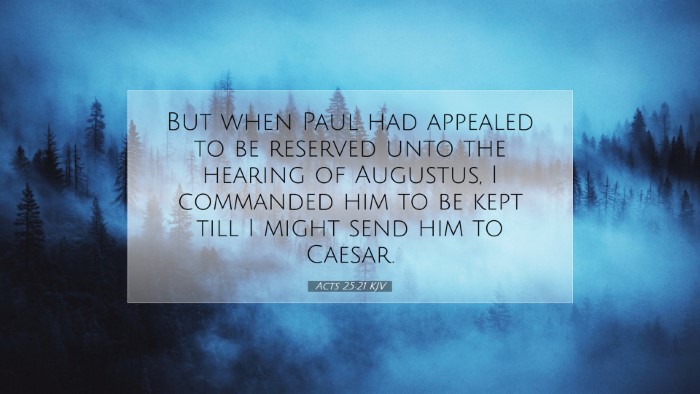Old Testament
Genesis Exodus Leviticus Numbers Deuteronomy Joshua Judges Ruth 1 Samuel 2 Samuel 1 Kings 2 Kings 1 Chronicles 2 Chronicles Ezra Nehemiah Esther Job Psalms Proverbs Ecclesiastes Song of Solomon Isaiah Jeremiah Lamentations Ezekiel Daniel Hosea Joel Amos Obadiah Jonah Micah Nahum Habakkuk Zephaniah Haggai Zechariah MalachiActs 25:21
Acts 25:21 KJV
But when Paul had appealed to be reserved unto the hearing of Augustus, I commanded him to be kept till I might send him to Caesar.
Acts 25:21 Bible Commentary
Commentary on Acts 25:21
Verse: Acts 25:21 - "But when Paul had appealed to be reserved unto the hearing of Augustus, I commanded him to be kept until I might send him to Caesar."
Introduction
The verse Acts 25:21 serves as a pivotal point in the narrative of the Apostle Paul’s legal troubles and his journey towards Rome. This verse not only highlights the political climate of the time but also showcases Paul’s unyielding commitment to his mission as well as the divine providence at work in his life. Commentary from respected theologians and biblical scholars offers profound insights into the meaning and implications of this verse.
Historical Context
Matthew Henry notes that Paul’s situation is set against the backdrop of Roman law and governance. The reference to "Augustus" implies the highest authority in the Roman Empire, demonstrating the significance of Paul’s appeal. In the Roman legal system, an appeal to Caesar was a right afforded to Roman citizens, thereby underscoring Paul's identity and rights as a Roman citizen.
Roman Legal Process
Albert Barnes explains that the Roman legal system was marked by a need for formalities and protocols, which Paul navigated skillfully. His appeal was a strategic move, forcing the governors to reconsider their actions in light of Roman law. This appeals process illustrates not only Paul’s legal acumen but also God’s sovereign orchestration of events to ensure the spread of the Gospel.
Theological Insights
The implications of Acts 25:21 extend beyond mere legalities and into the realm of divine purpose. Adam Clarke comments on how Paul’s appeal to Caesar was not only about seeking justice but also about fulfilling his God-given mission to testify in Rome. The apostle had received a promise from God regarding his journey to Rome (Acts 23:11), and this appeal was central to that promise being realized.
Paul’s Faith and Perseverance
Henry highlights Paul’s unwavering faith amidst adversity, illustrating that even in his legal struggles, he maintained a focus on the Lord's promise. This faith transformed a moment of potential despair into an opportunity for witness. Paul's appeal acts as a testament to his reliance on God and his commitment to proclaiming the Gospel despite the odds.
Application for Believers
For modern-day believers, Acts 25:21 poses significant reflections on the use of legal and political avenues in the pursuit of justice and truth. It raises the question of how Christians should interact with legal systems in their own contexts. Observations from Barnes suggest that Christians ought to stand firm in their rights while also being prepared to accept God’s providence, recognizing that He may work through human authorities.
Witness and Testimony
Moreover, Clarke emphasizes the importance of maintaining a testimony. Paul’s appeal was not merely about his personal freedom; it was an opportunity to share the Gospel with the highest authorities of the time. This act draws attention to how believers today can utilize their circumstances, including legal situations, as platforms for witnessing to Christ.
Conclusion
In summary, Acts 25:21 serves as an important reminder of God's sovereignty in the lives of believers, even in complex legal circumstances. The insights provided by Matthew Henry, Albert Barnes, and Adam Clarke deepen our understanding of the importance of Paul's appeal. It reflects both a commitment to justice and the fulfillment of divine promise, calling us to navigate our challenges with faith, perseverance, and a commitment to witness.
Further Considerations
- The interplay of faith and legal rights in the early church.
- The significance of appeals to authority within a Christian context.
- God’s providential guidance amidst human systems.
As we reflect on Acts 25:21, may we learn to trust in God’s plan, embracing the opportunities that arise even in our trials.


